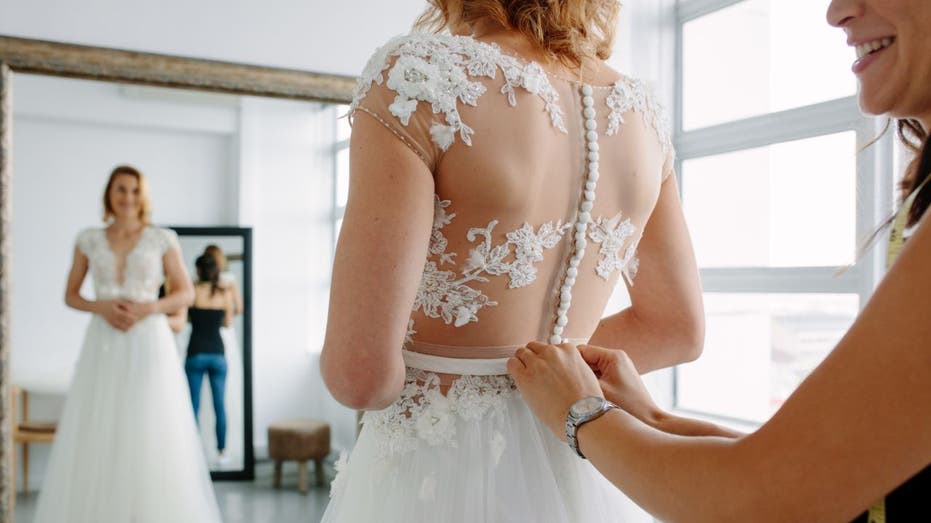8 budgeting tips for your wedding day to cut the financial stress of saying 'I do'
Effective budgeting is the key to staying within your means for your wedding day
The Knot Worldwide CEO: Weddings are still happening, just a little bit later
The Knot Worldwide CEO on helping couples' wedding plans
Weddings can be an expensive milestone. The average cost of a wedding in 2023 is $30,000, according to The Knot, and that number doesn't include an engagement ring.
As couples plan a wedding, purchase a first home and consider the cost of having children soon thereafter, the idea of debt can surely overwhelm two people. The cost of major life moments can quickly accumulate if you don't plan accordingly.
Many newly engaged couples don't begin saving for a wedding until a proposal. But waiting this long to put some money away for the big day can add unnecessary stress to your relationship. Instead of waiting until after an engagement to start saving, begin putting money aside as soon as you are able to.
If you plan on having a wedding one day in the future, try saving before even finding a significant other. Avoid scrambling to put money together when it's too close to the real thing, even if it seems a little silly.
When it's time to plan, though, there are plenty of ways to keep your wedding within a reasonable budget. The easiest way to do so is to determine a budget, and stick to it. The last thing you want is a wedding you can't afford and an accumulation of debt for one day of a lifetime.

The average wedding cost in 2023 was $30,000. (iStock / iStock)
HERE'S WHY WEDDING INSURANCE SHOULD BE ON YOUR MARRIAGE TO-DO LIST
Below are a few tips for budgeting for a wedding.
- Come up with a savings plan
- Map out where your wedding day funding is coming from
- Compile a list of everything that goes into a wedding
- Do not empty your savings
- Set up a wedding emergency fund
- Consider how much you have and how much you need
- Keep track of your expenses in a spreadsheet
- Find ways to save
1. Come up with a savings plan
Come up with a savings plan as soon as possible.
Each individual's plan is going to look different depending on the stage of a relationship, your monthly or annual income and other factors.
If you are single but plan for an extravagant wedding down the road, put a few dollars aside biweekly or monthly. Once you meet someone you could see a future with, start putting a little more money aside. Then, when an engagement is near, add even more money into your savings account.
This may seem silly now, but you will be thanking yourself down the road when you already have a nice wedding day cushion.

The earlier wedding saving starts, the less financially stressful planning will be down the line. (iStock / iStock)
HOMEOWNERSHIP IS THE HOT NEW WEDDING GIFT
Another key to saving for a wedding is to always be saving for other expensive life moments, too. A wedding should be just one category of your savings. Make sure you are also contributing to things like an emergency fund, savings for home or car buying, children, retirement and general savings.
2. Map out where your wedding day funding is coming from
Once wedding planning begins, you'll need to figure out where all the money for your wedding is coming from.
Which partner is paying for which items? Are your parents contributing anything? What will you ask groomsmen and bridesmaids to contribute to?
While there are traditional roles that a bride or groom's family is typically responsible for, this may differ by relationship or not be a consideration at all anymore.
Some couples pay for their wedding completely on their own while others receive money or gifts to help with the cost from family members.
Account for every dollar and figure out how much you have saved and how much you might need additional for your wedding day.
3. Compile a list of everything that goes into a wedding
There is a lot more that goes into a wedding than you might think. A venue, catering, photographers, entertainment and wedding attire are a few big items that come to mind. But beware, there are flowers, centerpieces, invitations, stamps, gifts, bar tabs and so much more.
WEDDING GIFT SPENDING: HOW MUCH IS TOO MUCH? HOW MUCH IS NOT ENOUGH?

There are so many different costs associated with a wedding that need to be considered when budgeting. (iStock / iStock)
The following is a breakdown of the typical items couples pay for, and what percentage of your budget should be allocated to each category, according to Brides.com.
- Venue and catering (40%)
- Photography and videography (15%)
- Music/entertainment (10%)
- Flowers (10%)
- Decor (10%)
- Wedding attire and beauty (5%)
- Transportation (3%)
- Stationary (3%)
- Favors and gifts (2%)
- Cake (2%)
Additionally, there are aspects of an event not included in this list, like the cost of alcohol, an open bar and wedding rings for the bride and groom.
Consider that there may be categories that you spend more or less on depending on your preferences. For example, if you want to have a live band for your wedding rather than a DJ, you'll likely have to dedicate more than 10% of your budget to music. If you are renting flowers or making a lot of decorations yourself, you may spend less in these categories.
4. Do not empty your savings
Whatever you do, no matter how tempting it may be, do not empty your savings. Weddings can be a huge expense, but putting every penny you have into could be detrimental.
CLICK HERE TO SIGN UP FOR OUR LIFESTYLE NEWSLETTER

Do not empty your savings or go in debt for a wedding. Save accordingly and keep money allocated for your wedding day. (iStock / iStock)
When wedding planning, it's important to keep enough money in your savings for other aspects of life, too. Your bills aren't going to stop because you're getting married.
Consider using a rewards or travel credit card for some wedding expenses. Collect points to use for your honeymoon. The caveat is that this is only a good idea if you are able to pay your credit card off. If you are putting payments on a credit card because you don't have the money, this can quickly add up to a lot of debt.
5. Set up a wedding emergency fund
You likely have an emergency fund for everyday life, so set some extra money aside just in case you go over budget while planning your wedding day.
Unwanted, unexpected surprise costs can arise as you plan. To avoid the stress of an unexpected expense, have some money set aside beyond your budget, so you can handle that payment quickly.
6. Consider how much you have and how much you need
Once you know how much money you have to spend, estimate the cost of your wedding day festivities. While it doesn't have to be an exact number, it would be smart to get as close as possible to the big-ticket items like venue, catering and entertainment. Once you have a rough idea of cost, compare it against what you already have saved.
CLICK HERE TO GET THE FOX NEWS APP

There are several ways to cut down on wedding costs, like where you purchase your wedding dress. (iStock / iStock)
If the numbers are similar, you have your budget set. If the amount you want to spend is much higher than your savings, you can consider a few options.
First, find ways you can cut down costs. You can lower the guest count, choose a less expensive venue, buy a less expensive dress, design and print your own invitations, etc.
Additionally, you could push back the wedding date if you need more time to save.
7. Keep track of your expenses in a spreadsheet
Over the months you are planning your wedding, keep track of all your purchases. You will feel organized, have a greater understanding of your budget and have a checklist of items you've completed.
Customize the spreadsheet in a way that makes the most sense to you.
8. Find ways to save
While planning, always think of ways make money and save. If you really want to have real flowers, buy real flowers. But if the wedding cake isn't as important to you, order donuts or cupcakes.
If it makes sense and you have the time to pick up a little extra work to contribute to your wedding fund, consider a part-time job also.
There are many simple trade-offs to save.




















